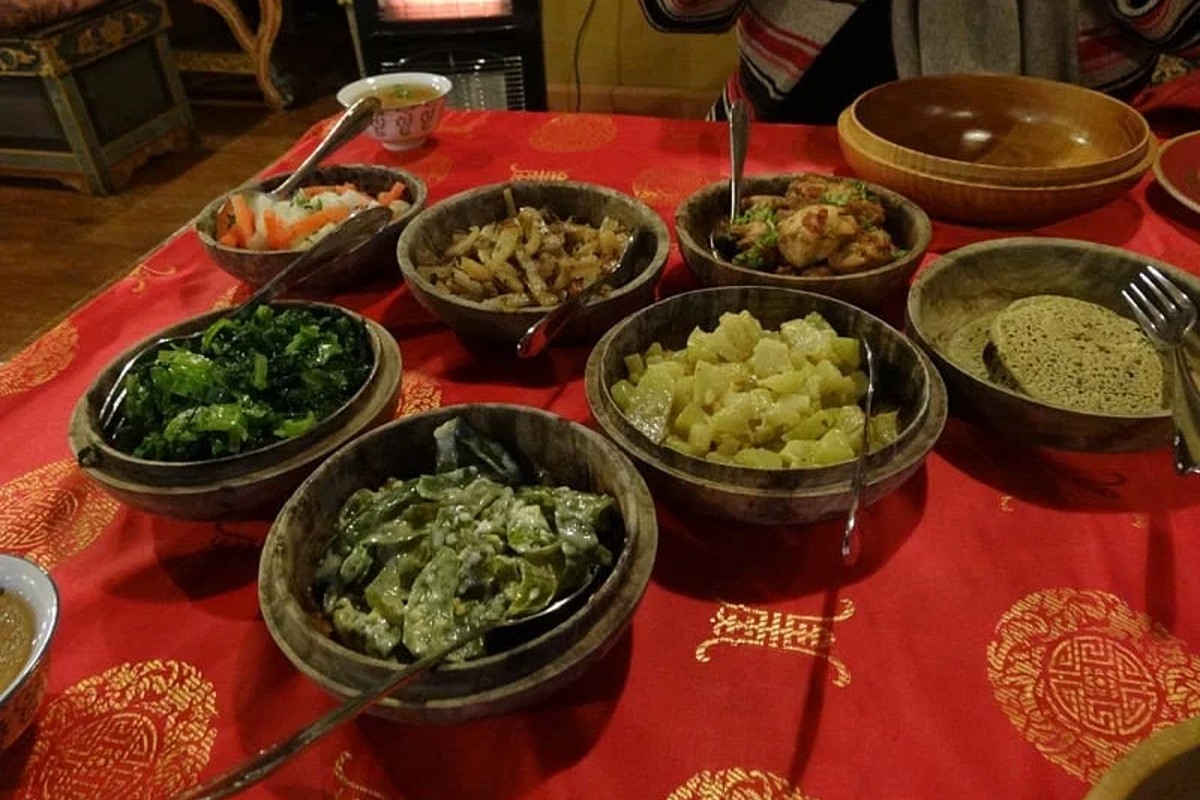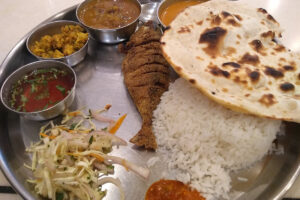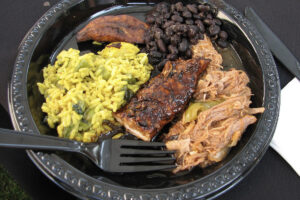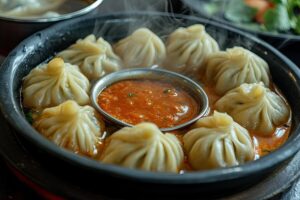Nestled amidst the majestic Himalayas, the Kingdom of Bhutan boasts a culinary tradition deeply rooted in its environment and cultural heritage. Bhutanese cuisine emphasizes fresh, seasonal ingredients, a fiery love for chilies, and a respect for traditional cooking methods. Join me on a delicious exploration of the must-try dishes that represent the heart and soul of Bhutanese food.
1. Ema Datshi: The National Dish of Bhutan
Description:
Ema Datshi is the undisputed national dish of Bhutan and a source of immense pride for its people. This simple yet incredibly flavorful dish consists of chilies (ema) cooked in a rich and creamy cheese sauce (datshi). The intensity of the chilies can vary, from mild to fiery hot, making it a dish that appeals to a wide range of palates. Ema Datshi is often served alongside red rice, creating a satisfying and quintessential Bhutanese meal.
Recipe:
https://worldtravelchef.com/ema-datshi-chili-cheese-from-bhutan/
Key Ingredients:
Chilies (often large green chilies), farmer’s cheese, onions, tomatoes, garlic, oil, and salt.
Popular Restaurant:
Folk Heritage Museum Restaurant in Thimphu (Offers an authentic Ema Datshi experience in a traditional setting)
2. Kewa Datshi: Potatoes and Cheese Delight
Description:
Kewa Datshi is a comforting and satisfying dish showcasing the Bhutanese love of cheese. Potatoes (kewa) are simmered in a creamy cheese sauce (datshi) similar to the one used in Ema Datshi. The mildness of the potatoes complements the richness of the cheese sauce, creating a balanced and flavorful dish perfect with red rice.
Recipe:
https://www.allrecipes.com/recipe/258879/kewa-datshi-bhutanese-dish/
Key Ingredients:
Potatoes, farmer’s cheese, onions, tomatoes, garlic, chilies (optional), oil, and salt.
Popular Restaurant:
Bhutan Kitchen in Thimphu (Well-known for its Kewa Datshi and other traditional Bhutanese dishes)
3. Shakam Paa: Dried Beef with a Twist
Description:
Shakam Paa is a unique and flavorful dish made from dried beef. The beef is preserved and dried, intensifying its flavor, and then cooked with chilies, dried radish, and sometimes cheese. The result is a chewy, salty, and intensely savory dish that is often enjoyed as a snack or alongside other dishes.
Recipe:
http://www.deki.bhutantourarchitect.com/2016/06/shakam-paa-dried-beef-with-potatoes.html
Key Ingredients:
Dried beef, chilies, dried radish, cheese (optional), onions, garlic, oil, and salt.
Popular Restaurant:
Many restaurants in Bhutan specializing in traditional cuisine will feature Shakam Paa on their menus.
4. Jasha Marhu: Bhutanese-style Chicken Curry
Description:
Jasha Marhu is a beloved chicken curry dish in Bhutan. Chicken pieces are cooked in a flavorful sauce with tomatoes, onions, garlic, ginger, and chilies. The addition of Sichuan pepper adds a distinctive tingling sensation to the dish. Jasha Marhu is often served with red rice or flatbreads.
Recipe:
https://whattocooktoday.com/bhutanese-spicy-chicken-stew-jasha-maroo.html
Key Ingredients:
Chicken, onions, tomatoes, ginger, garlic, chilies, Sichuan pepper, oil, and salt.
Popular Restaurant:
Zombala Restaurant in Thimphu (Serves a delicious Jasha Marhu)
5. Phaksha Paa: A Flavorful Pork Dish
Description:
Phaksha Paa is a hearty and satisfying pork dish that showcases the Bhutanese love for chilies. Sliced pork is stir-fried with dried chilies, garlic, ginger, and sometimes local vegetables like radish or spinach. The result is a spicy and savory dish that perfectly balances the richness of the pork with the fiery chilies.
Recipe:
https://culinarycreationss.com/posts/bhutanese-culinary-delight-phaksha-paa-recipe
Key Ingredients:
Pork, dried red chilies, garlic, ginger, onions, vegetables (optional), oil, and salt.
Popular Restaurant:
Babesa Village Restaurant in Thimphu (Known for its authentic Phaksha Paa)
6. Momos: Steamed Dumplings with Bhutanese Flair
Description:
Momos are a beloved Himalayan food that has found a special place in Bhutanese cuisine. These steamed dumplings are filled with a variety of savory ingredients, most commonly minced meat (pork, beef, chicken) or vegetables mixed with cheese. Momos are served with a spicy tomato-based dipping sauce for a burst of flavor.
Recipe:
https://www.food.com/recipe/momo-dumplings-bhutan-477882
Key Ingredients:
Flour dough, minced meat or vegetables, cheese (optional), onions, garlic, ginger, spices (cumin, coriander, turmeric), tomato-based dipping sauce.
Popular Restaurant:
The Momo Corner in Thimphu (Specializes in a variety of delicious momos)
7. Goephu Tripe: An Acquired Taste
Description:
Goephu Tripe is a traditional Bhutanese dish made from cooked tripe (cow stomach). The tripe is cleaned thoroughly and cooked in a spicy stew with onions, tomatoes, chilis, garlic, and ginger. This dish has a chewy texture and an intense, savory flavor that might be considered an acquired taste.
Recipe:
https://www.youtube.com/watch?v=NVAX1XAKTUU
Key Ingredients:
Tripe, onions, tomatoes, chilies, garlic, ginger, oil, and salt.
Popular Restaurant:
Traditional Bhutanese restaurants may offer Goephu Tripe, but it’s less common than other dishes.
8. Red Rice: Bhutan’s Staple Grain
Description:
Red rice is a staple food in Bhutan, grown in the fertile valleys of the country. This slightly nutty-flavored rice has a reddish hue and a slightly chewy texture. It’s a nutritious and satisfying accompaniment to the flavorful curries and stews of Bhutanese cuisine.
Recipe:
https://togetherwomenrise.org/recipes/bhutanese-red-rice-pilaf/
Key Ingredients:
Red rice
Popular Restaurant:
Red rice is widely served in Bhutanese restaurants, especially those focused on traditional cuisine.
9. Ara: The Local Spirit
Description:
Ara is a traditional alcoholic beverage commonly brewed in Bhutanese homes. It’s made from fermented rice, maize, wheat, or barley, and has a distinctive taste and aroma. Ara is often consumed during festivals, celebrations, and social gatherings.
Recipe:
https://culinarycreationss.com/posts/bhutan-ara-a-flavorful-journey-into-bhutanese-cuisine
Key Ingredients:
Fermented grains (rice, maize, wheat, or barley)
Popular Restaurant:
While Ara is less commonly served in restaurants, some bars specializing in local drinks might offer it.
Note: Ara consumption may require some caution, as homemade brews can vary in strength and quality.




